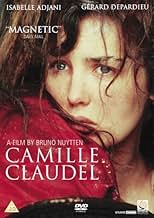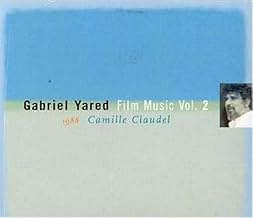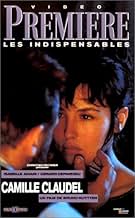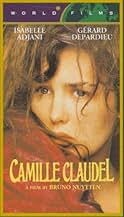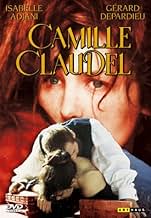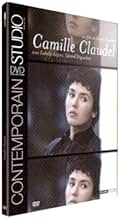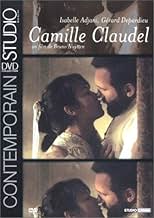AVALIAÇÃO DA IMDb
7,3/10
7,7 mil
SUA AVALIAÇÃO
Camille Claude impressiona o já famoso escultor Auguste Rodin. Ele a contrata como sua assistente, mas logo Camille começa a esculpir-se e também se torna sua amante. Mas depois de um tempo,... Ler tudoCamille Claude impressiona o já famoso escultor Auguste Rodin. Ele a contrata como sua assistente, mas logo Camille começa a esculpir-se e também se torna sua amante. Mas depois de um tempo, ela gostaria de sair da sombra dele.Camille Claude impressiona o já famoso escultor Auguste Rodin. Ele a contrata como sua assistente, mas logo Camille começa a esculpir-se e também se torna sua amante. Mas depois de um tempo, ela gostaria de sair da sombra dele.
- Direção
- Roteiristas
- Artistas
- Indicado a 2 Oscars
- 7 vitórias e 14 indicações no total
Avaliações em destaque
A *very* powerful film about a woman and her life. Acting and setup is so good that it can leave permanent scars on your psyche. Hitchcock can scare for a few minutes, while this movie can scare you for life. Do not watch while depressed. I give it a minimum of 8 out of 10. Wonderful job.
I couldn't take my eyes away from the television, and it wasn't because it was in French with English subtitles. This is a superbly acted film depicting two artists' work, passion, fears and ultimately her downfall, falling victim to her own creative mind.
Now that this wonderful story will be a Broadway musical in 2003 under the finesse of Frank Wildhorn and the magical voice of lovely Linda Eder, one will certainly appreciate familiarizing themselves with the background of the subject of this movie, Camille Claudel.
Now that this wonderful story will be a Broadway musical in 2003 under the finesse of Frank Wildhorn and the magical voice of lovely Linda Eder, one will certainly appreciate familiarizing themselves with the background of the subject of this movie, Camille Claudel.
There's some nice photography in here, which is what helped me get through this long (159 minutes) soap opera-type story about the girlfriend (the title name, played by Isabelle Adjani) of the famous sculptor Rodin (Gerard Depardieu).
There are a lot of closeups of Adjani which was fine with me as I never get tired of seeing her looks. "Camille" also was a sculptor but when the romance with Rodin went sour, she went literally crazy. This movie details that saga.
In addition to the cinematography, you get to see some great sculptures - really good pieces of work. I just wish they had shown how the artists accomplished these pieces. Since they are just actors, all it did was show the two leads chipping away chunks of clay, never showing any detail work.
At least, the film made me appreciate the art form more.
There are a lot of closeups of Adjani which was fine with me as I never get tired of seeing her looks. "Camille" also was a sculptor but when the romance with Rodin went sour, she went literally crazy. This movie details that saga.
In addition to the cinematography, you get to see some great sculptures - really good pieces of work. I just wish they had shown how the artists accomplished these pieces. Since they are just actors, all it did was show the two leads chipping away chunks of clay, never showing any detail work.
At least, the film made me appreciate the art form more.
An exhibit of Rodin's sculptures was circling the Western United States a few years back. In any gallery in which they were exhibited they snapped heads; there are few figures that speak with such authority or superiority, mute testimony, like the Easter Island figures, to as much effort and skill. And so the movie `Camille Claudel', in like fashion, snaps heads in its understated power and commitment to craft.
Like Ansel Adams, Rodin stretched nature beyond what was possible they both showed us something that was not there and in the rendering made representations so striking they had no precedent and thus set the bar higher for subsequent generations of artists. As history played out, the far less well known sculptor Camille Claudel made substantial contributions but her tie to Rodin (and eventually her personal decline) for a period in the late nineteenth century is the focus in this instance. In truth, her story demanded to be filmed; she stands a remarkable artist and most importantly the passion, talent and influence (inarguably on Rodin) she possessed went well beyond the `colorful' label oft attached to the gifted.
Historically, this film is probably not a bad representation of how events turned in her life. There are many issues and turns, and years for that matter, the details of which remain unclear to this day. But in its entirety this is a marvelous interpretation of the record. And without doubt Isabelle Adjani was the right actor for the job.
Stunningly beautiful, there are few women in history as arresting as Isabelle is; certainly Camille was not as lovely, but the resemblance is darned good as compared to actors chosen to portray historical figures in most movies based on true events and the people that were part of them. That Adjani brings some of the passion is certain. After all, bizarre, or at least socially unacceptable, behavior resulted in her eventual incarceration, so we know she was a handful.
Many of the key points of her upbringing are addressed; her father's stern and inconsistent yet lovingly supportive position in her life (this is more forcefully impressed on us as the years progress); her mother's complete non-support and dismissal of all that Camille does; her relationship with her less understanding and conflicted brother. But it is the period when she meets and falls for Rodin (and he with her) and their consequent tumultuous affair runs its course that is actually the focus of the film.
Gérard Depardieu's contribution as Rodin is probably the best work he has done. He looks (Rodin was 40 when he met the 21 year old Camille) very much as Rodin did in this period of his life. His love for his work, Camille and promoting his own career are his passions. We are lead through the minefield of his own making (his inability to get off a dime and marry Camille is their eventual downfall) and we are not totally sympathetic to his behavior. But this is the stuff of real life; as Seneca said, all art is but imitation of nature and both his and her own work convey their conflicted convictions.
The musical score haunts us, as it should, right from the opening of the film. Almost never detracting, it instead correctly underscores certain points in the narrative; but it is the opening where we see Camille scooping clay from beneath a Parisian street (and this is a well-crafted sequence) where we feel the upsurge of powerful currents operating. The music heightens our interest as we determine exactly what we are seeing.
Other nice touches in the film include an occasion where Camille and Rodin together study a model on a turntable, spinning the model about as metaphor for the emotional maelstrom gathering momentum. We also see a great moment when Rodin is caressing Camille's face, intercut with shots of him working clay into an as yet unidentifiable sculpture.
What follows the breakup of Camille and Rodin is essentially a retrospective of the downslide of a remarkable talent. The story of Claudel's own diminishing output of work and the steady erosion of her inability to cope with reality is frightening in its telling. At a meeting with Rodin some time after they have parted company she remarks that she has changed, and offers that `Nothing that's monstrous is foreign to me'. And so she truly (and sadly) withdraws into a world of her own making.
Rating: Four Stars.
Like Ansel Adams, Rodin stretched nature beyond what was possible they both showed us something that was not there and in the rendering made representations so striking they had no precedent and thus set the bar higher for subsequent generations of artists. As history played out, the far less well known sculptor Camille Claudel made substantial contributions but her tie to Rodin (and eventually her personal decline) for a period in the late nineteenth century is the focus in this instance. In truth, her story demanded to be filmed; she stands a remarkable artist and most importantly the passion, talent and influence (inarguably on Rodin) she possessed went well beyond the `colorful' label oft attached to the gifted.
Historically, this film is probably not a bad representation of how events turned in her life. There are many issues and turns, and years for that matter, the details of which remain unclear to this day. But in its entirety this is a marvelous interpretation of the record. And without doubt Isabelle Adjani was the right actor for the job.
Stunningly beautiful, there are few women in history as arresting as Isabelle is; certainly Camille was not as lovely, but the resemblance is darned good as compared to actors chosen to portray historical figures in most movies based on true events and the people that were part of them. That Adjani brings some of the passion is certain. After all, bizarre, or at least socially unacceptable, behavior resulted in her eventual incarceration, so we know she was a handful.
Many of the key points of her upbringing are addressed; her father's stern and inconsistent yet lovingly supportive position in her life (this is more forcefully impressed on us as the years progress); her mother's complete non-support and dismissal of all that Camille does; her relationship with her less understanding and conflicted brother. But it is the period when she meets and falls for Rodin (and he with her) and their consequent tumultuous affair runs its course that is actually the focus of the film.
Gérard Depardieu's contribution as Rodin is probably the best work he has done. He looks (Rodin was 40 when he met the 21 year old Camille) very much as Rodin did in this period of his life. His love for his work, Camille and promoting his own career are his passions. We are lead through the minefield of his own making (his inability to get off a dime and marry Camille is their eventual downfall) and we are not totally sympathetic to his behavior. But this is the stuff of real life; as Seneca said, all art is but imitation of nature and both his and her own work convey their conflicted convictions.
The musical score haunts us, as it should, right from the opening of the film. Almost never detracting, it instead correctly underscores certain points in the narrative; but it is the opening where we see Camille scooping clay from beneath a Parisian street (and this is a well-crafted sequence) where we feel the upsurge of powerful currents operating. The music heightens our interest as we determine exactly what we are seeing.
Other nice touches in the film include an occasion where Camille and Rodin together study a model on a turntable, spinning the model about as metaphor for the emotional maelstrom gathering momentum. We also see a great moment when Rodin is caressing Camille's face, intercut with shots of him working clay into an as yet unidentifiable sculpture.
What follows the breakup of Camille and Rodin is essentially a retrospective of the downslide of a remarkable talent. The story of Claudel's own diminishing output of work and the steady erosion of her inability to cope with reality is frightening in its telling. At a meeting with Rodin some time after they have parted company she remarks that she has changed, and offers that `Nothing that's monstrous is foreign to me'. And so she truly (and sadly) withdraws into a world of her own making.
Rating: Four Stars.
This film is beyond beautiful and beyond heartbreaking. After 19 years, it still tears the heart right out of me. I first saw "Camille Claudel" while it was on it's Oscar campaign in 1990 for "Best Foreign Film" and "Best Actress - Isabelle Adjani". I hadn't really begun to appreciate foreign film yet so I had no idea what to expect. What I saw was an angel beyond description giving one of the greatest acting performances I had EVER seen, still to this day. This film is heart-wrenching in it's beauty and romantic tragedy. In fact it makes art of it. I went back to the theater to watch it six times, I even dragged friends along. Yes the film was brilliant, but what I went back to see was perhaps the most beautiful woman I've ever seen on the big screen. Isabelle Adjani's beauty in this film is breath-taking and her performance is one of the most intense and deeply moving in history. I have this film on VHS and DVD. I still love to watch it.
Você sabia?
- CuriosidadesAlain Cuny, who plays Camille and Paul Claudel's father, actually met Paul Claudel. In 1944, Claudel, a poet and dramatist, personally chose Cuny to play Pierre de Craon in his play: The Tidings Brought to Mary.
- Citações
Camille Claudel: [to Auguste Rodin] You stole it all! My youth, my work! Everything!
- Versões alternativasThe North American theatrical release was cut to 158 minutes. The Region 1 VHS and DVD releases used this cut print. The full-length 175-minute version is available on Region 2 DVDs released in Europe. The version on Blu-Ray and Amazon Prime Video is 173 minutes, just 2 minutes short of the original European release.
Principais escolhas
Faça login para avaliar e ver a lista de recomendações personalizadas
- How long is Camille Claudel?Fornecido pela Alexa
Detalhes
- Data de lançamento
- País de origem
- Central de atendimento oficial
- Idiomas
- Também conhecido como
- Bir Kadın
- Empresas de produção
- Consulte mais créditos da empresa na IMDbPro
Bilheteria
- Faturamento bruto nos EUA e Canadá
- US$ 3.331.297
- Fim de semana de estreia nos EUA e Canadá
- US$ 89.273
- 25 de dez. de 1989
- Faturamento bruto mundial
- US$ 3.331.892
- Tempo de duração2 horas 55 minutos
- Mixagem de som
- Proporção
- 2.35 : 1
Contribua para esta página
Sugerir uma alteração ou adicionar conteúdo ausente

Principal brecha
By what name was Camille Claudel (1988) officially released in India in English?
Responda
![Assistir a Bande-annonce [OV]](https://m.media-amazon.com/images/M/MV5BOTI2NDAyODUtMzAzZi00OTE4LThlYjItZjYwYjk1OThkMDQwXkEyXkFqcGdeQXRyYW5zY29kZS13b3JrZmxvdw@@._V1_QL75_UX500_CR0)


